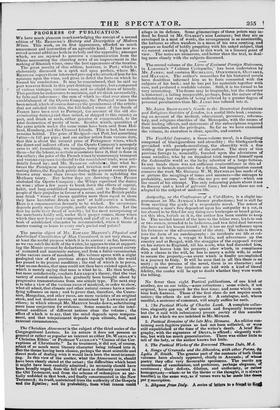PROGRESS OF PUBLICATION.
WE have much pleasure in acknowledging the receipt of a second edition of Mr. REDDING'S History and Description of Modern Wines. This work, on its first appearance, afforded us much amusement and instruction of an agreeable kind. It has now re- ceived several additions both in its body and the appendix ; amongst which, we are rejoiced to perceive a communication from the Rhine announcing the cheering news of an improvement in the making of Rhenish wines, since the first appearance of the treatise. The great novelty of this edition, however, is Port ; which is elaborately discussed in a spick and span preface, where Mr. REDDING repays those interested persmsi who attacked him for his opinions upon the wine, and gives in detail the facts on which he formed his conclusions. It may be remembered, that lie said no port was ever drunk in this port-drinking country, but a compound of various vintages, various wines, and no slight doses of brandy. This position lie endeavours to maintain, and we think successfully, by facts and inferences : the sum of which is—that ever since the establishment of the Oporto Company, the Portugal wines have been mixed, which of course destroys the genuineness of the article; that not satisfied with this, the full-bodied wines of the South of France have been sent to Portugal, (on account of the old dis- criminating duties,) and then mixed, or shipped to this country as port, and drank as such, either genuine or compounded, to the total destruction of purity of taste. Besides which, quantities of the same article under the same name have been sent from Hol- land, Hamburg, and the Channel Islands. This is bad, but worse remains behind. The price of Rosignol—not Port, but something letter—is 121. per pipe ; and our author infers from various data, that this is about the natural price of Portuguese wines, which the direct and indirect effects of the Oporto Company's monopoly raise to 401. (something, we imagine, being allowed for keeping them—for the labour, as certain economists have it, that is done in the cellar) ; the price of the French wines by unnecessary transport and various expenses incidental to the roundabout trade, were arti- ficially forced up; and Mr. REDDING calculate, that what be- tween the Portuguese monopoly and taxation and our own pro- tecting duties,the English public during the present century have thrown away more than twenty-five millions in upholding the Methuen treaty. But better days are dawning—Don PEDRO abolished the Oporto Company; the Whigs equalized the duties on wine ; allow a few years to break down the effects of capital, habit, and long-established management, and to disabuse the people of their prejudice in favour of a name, and the British public may drink "wines of vinous qualities more than equal to those they have heretofore drunk as port" at half-a-crown a bottle. Here is a consummation devoutly to be wished. Its occurrence depends partly upon the people, partly upon the dealers. Let the first lay aside their dread of novelty; let the most enterprising of the merchants boldly sell, under their proper names, those wines which they now keep and compound, and puff off as port. Need a book of established character be recommended, when it treats of matter coining so home to every one's pocket and palate?


























 Previous page
Previous page